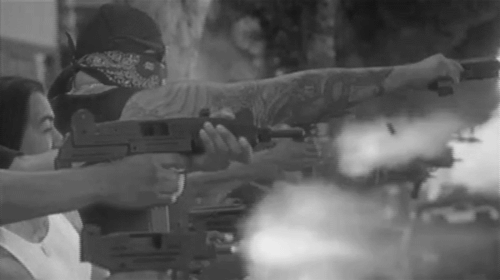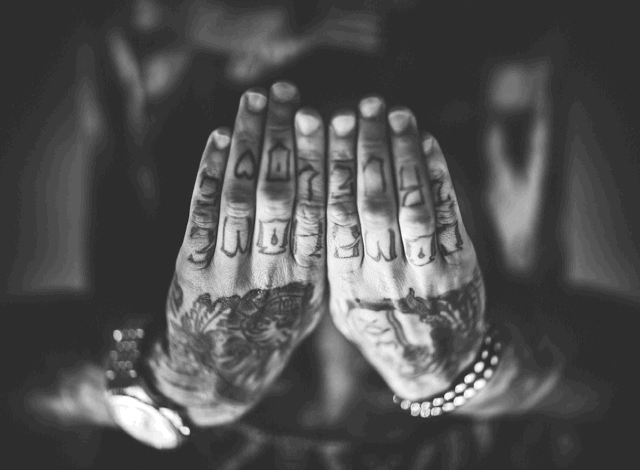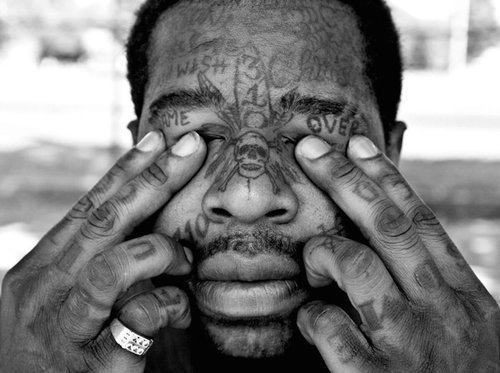Why do you think more and more people wear tattoos (regardless of whether they belong to gangs or not)?

 Everyday more and more people decides to wear tattoos on their bodies, regardless of whether they belong to gangs or not. The tattoo phenomenon isn't brand new, but the phenomena that almost everyone wants to get a tattoo, or even more than one is new. Before, one single tattoo was enough, now people want their bodies to be more and more covered in ink. Also, once ages ago, tftooes were associated with sailors, and gang members, now everyone has one. But why ? We could think that people nowadays have more and more tattoos, independently of their history background. Maybe some people do it for the seek of adrenaline. Others maybe, to feel unique as individuals. People exist of all kinds, which mean that they can get a tattoo for different reasons: as a memorial of a person, place, date etc. Some people claim that they decide to have a tattoo to express their personality and passions. while others argue that they decid to have one just to feel beautiful, and more in peace with themselves and their body. Yet we can't deny that people get tattoos for all kind of reasons. The human race is unpredictable.
Everyday more and more people decides to wear tattoos on their bodies, regardless of whether they belong to gangs or not. The tattoo phenomenon isn't brand new, but the phenomena that almost everyone wants to get a tattoo, or even more than one is new. Before, one single tattoo was enough, now people want their bodies to be more and more covered in ink. Also, once ages ago, tftooes were associated with sailors, and gang members, now everyone has one. But why ? We could think that people nowadays have more and more tattoos, independently of their history background. Maybe some people do it for the seek of adrenaline. Others maybe, to feel unique as individuals. People exist of all kinds, which mean that they can get a tattoo for different reasons: as a memorial of a person, place, date etc. Some people claim that they decide to have a tattoo to express their personality and passions. while others argue that they decid to have one just to feel beautiful, and more in peace with themselves and their body. Yet we can't deny that people get tattoos for all kind of reasons. The human race is unpredictable.
As far as i'm concerned, I must admit that I'm definitely convinced the reason why people feel every time the need to get a tattoo is directly linked with celebrities. We feel the urge to be identifies with a group, and to feel perfect. A lot of people believe that to be famous, successful, perfect, to feel identified with a group of people, etc, they have have to look like celebrities. So they think that by being just like famous people, they could be all of the above.
| Adam Levine from Maroon 5 |
| Wiz Khalifa |
Why do young people join gangs ?
 Gangs are often a really good alternative for young people who had lost everything (their home, parents or any other thing), or who are in a really difficult situation. The Complex situations young people come from are often related to their families, such as domestic violence, or the lack of parental supervision. For young people in these situations, Gangs represent a foster family. They welcome them with arms wide open. Once they want to leave, they can't do it as easily as they get in. An another reason young people could join gangs might be the lack of jobs for youth, leaving them in poverty. As we live in a consumer society, people see those people who have lost their jobs are seen a failure, Which is why those young people are left in a social isolation.
Gangs are often a really good alternative for young people who had lost everything (their home, parents or any other thing), or who are in a really difficult situation. The Complex situations young people come from are often related to their families, such as domestic violence, or the lack of parental supervision. For young people in these situations, Gangs represent a foster family. They welcome them with arms wide open. Once they want to leave, they can't do it as easily as they get in. An another reason young people could join gangs might be the lack of jobs for youth, leaving them in poverty. As we live in a consumer society, people see those people who have lost their jobs are seen a failure, Which is why those young people are left in a social isolation. It is true that not all gangs are the same. Basically a distinction can be made between really violent gangs and "normally violent" ones. Moreover, it is worth mentioning that it isn't always easy to escape the pull of gang life, but it is possible. Getting out of gang lifestyles is an opportunity, that only a few take. Even though we can't deny that a large percentage of people who leave gang life, return sooner or later, to their habits. As they were used to live a life full of adrenaline, the fact that once they leave, this adrenaline goes missing, makes them go back. This same adrenaline could be an another reason why young people join gangs.
It is true that not all gangs are the same. Basically a distinction can be made between really violent gangs and "normally violent" ones. Moreover, it is worth mentioning that it isn't always easy to escape the pull of gang life, but it is possible. Getting out of gang lifestyles is an opportunity, that only a few take. Even though we can't deny that a large percentage of people who leave gang life, return sooner or later, to their habits. As they were used to live a life full of adrenaline, the fact that once they leave, this adrenaline goes missing, makes them go back. This same adrenaline could be an another reason why young people join gangs. What link can you see between both topics and the notion of power ?
 The way we see tattoos have evolved through time. Paradoxical as it may see, ages ago only sailors and gangs wore tattoos, now everyone wears them. In politics and social science, power is the ability to influence people's behavior. In order to live together, members of a community have to accept rules, regulations, laws. This helps to create social cohesion.
The way we see tattoos have evolved through time. Paradoxical as it may see, ages ago only sailors and gangs wore tattoos, now everyone wears them. In politics and social science, power is the ability to influence people's behavior. In order to live together, members of a community have to accept rules, regulations, laws. This helps to create social cohesion.
Tattoos could be seen as a form of counter-power, and by definition a gang is a counter-power. Counter-power is a form of power that goes against the establishment. We could then say that tattoos and gangs have more in common than we thought.
It is generally agreed that in gangs, or in prisons, tattoos take a whole new explanation. They can show the number of times a person was sent to prison, or how many people the person has killed.
 Actually it would be more accurate to say that for criminals, tattoos are a mark of power in gangs. The more tattoos you have, the more criminal things you have done, the more power you have, the more respected you are. Which is contradictory, because for us, the more criminal things you have done, the less respected you are, the less power you have
Actually it would be more accurate to say that for criminals, tattoos are a mark of power in gangs. The more tattoos you have, the more criminal things you have done, the more power you have, the more respected you are. Which is contradictory, because for us, the more criminal things you have done, the less respected you are, the less power you have
It is generally agreed that in gangs, or in prisons, tattoos take a whole new explanation. They can show the number of times a person was sent to prison, or how many people the person has killed.
 Actually it would be more accurate to say that for criminals, tattoos are a mark of power in gangs. The more tattoos you have, the more criminal things you have done, the more power you have, the more respected you are. Which is contradictory, because for us, the more criminal things you have done, the less respected you are, the less power you have
Actually it would be more accurate to say that for criminals, tattoos are a mark of power in gangs. The more tattoos you have, the more criminal things you have done, the more power you have, the more respected you are. Which is contradictory, because for us, the more criminal things you have done, the less respected you are, the less power you have
To cut a long story short, it all comes down to saying that in both cases, having a tattoo or being part of a gang have the idea being powerful. People have tattoos to feel powerful, just as young people join groups. Which is why we could say that this topic illustrates the notion of power. The flip side of the coint is that feeling powerful with a tattoo has nothing to do with feeling powerful by joining a gang. The truth of the matter is that by having a tattoo you don't hurt anyone, whereas once you join a gang you start hurting a really important amount of people.

